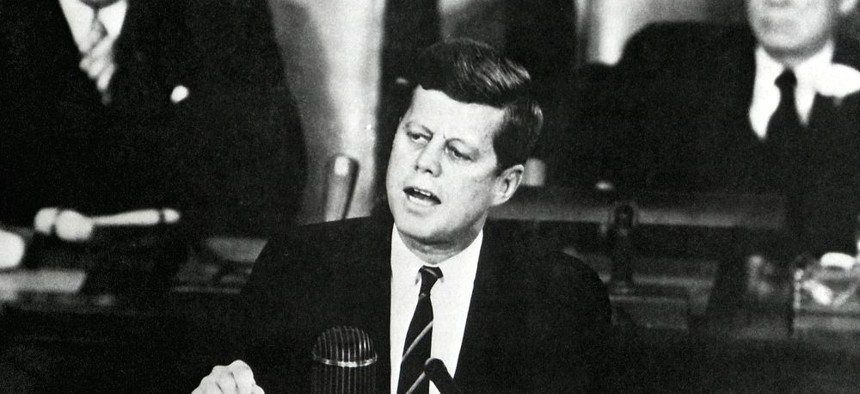
Speaking to Congress and the nation at the joint session of Congress on May 25, 1961. NASA
The 10 Most Historic State of the Union Moments in Modern History
From Kennedy to Obama, a video history of past State of the Unions.
Tuesday evening President Barack Obama delivers the first State of the Union address of his second term. In the past, State of the Union addresses serve as an opportunity for presidents to get specific about their agendas and set broad goals for American progress.
At other times, the State of the Union address has been the scene of drama: Nixon’s acknowledgement of the Watergate scandal that would end his presidency but nine months later, Carter's powerlessness in the face of the Iranian hostage crisis or Obama’s scolding of the Supreme Court over Citizens United .
Republican or Democrat, the State of the Union address always finds itself at the crossroads of history. Below are 10 of contemporary history's most historic moments:
John F. Kennedy
May 25, 1961*
"I believe that this nation should commit itself to achieving the goal, before this decade is out, of landing a man on the moon and returning him safely to the Earth."
*This was not technically a "State of the Union" address as we've come to know it. As JFK said at the opening of his address, "The Constitution imposes upon me the obligation to 'from time to time give to the Congress information of the State of the Union.' While this has traditionally been interpreted as an annual affair, this tradition has been broken in extraordinary times. These are extraordinary times. And we face an extraordinary challenge."
Lyndon Johnson
Jan. 8, 1964
“Let us carry forward the plans and programs of John Fitzgerald Kennedy--not because of our sorrow or sympathy, but because they are right.”
Less than two months after President Kennedy's assassination, Johnson was tasked with moving the nation forward in his first State of the Union address. He was the first president to give a State of the Union following the assassination of his predecessor since Teddy Roosevelt did so on Dec. 3, 1901. Johnson concluded his address, saying:
My good friends and my fellow Americans: In these last 7 sorrowful weeks, we have learned anew that nothing is so enduring as faith, and nothing is so degrading as hate.
John Kennedy was a victim of hate, but he was also a great builder of faith--faith in our fellow Americans, whatever their creed or their color or their station in life; faith in the future of man, whatever his divisions and differences.
This faith was echoed in all parts of the world. On every continent and in every land to which Mrs. Johnson and I traveled, we found faith and hope and love toward this land of America and toward our people.
So I ask you now in the Congress and in the country to join with me in expressing and fulfilling that faith in working for a nation, a nation that is free from want and a world that is free from hate--a world of peace and justice, and freedom and abundance, for our time and for all time to come.
Richard Nixon
Jan. 30, 1974
“One year of Watergate is enough.”
Nearing the end of his State of the Union address, Nixon took a moment to acknowledge the scandal that had engulfed his administration. By August he would resign in disgrace.
Mr. Speaker, and Mr. President, and my distinguished colleagues and our guests: I would like to add a personal word with regard to an issue that has been of great concern to all Americans over the past year. I refer, of course, to the investigations of the so-called Watergate affair. As you know, I have provided to the Special Prosecutor voluntarily a great deal of material. I believe that I have provided all the material that he needs to conclude his investigations and to proceed to prosecute the guilty and to clear the innocent.
I believe the time has come to bring that investigation and the other investigations of this matter to an end. One year of Watergate is enough.
Gerald Ford
Jan. 15, 1975
“ I must say to you that the state of the Union is not good.”
Ford assumed the presidency following Nixon's resignation and during a time of deep pessimism about government. He used his first State of the Union to address the reality of the situation: the state of the Union was not good. He concluded his address, saying:
When I became President only five months ago, I promised the last Congress a policy of communication, conciliation, compromise, and cooperation. I renew that pledge to the new members of this Congress.
Let me sum it up. America needs a new direction, which I have sought to chart here today—a change of course which will: put the unemployed back to work; increase real income and production; restrain the growth of federal government spending; achieve energy independence; and advance the cause of world understanding.
We have the ability. We have the know-how. In partnership with the American people, we will achieve these objectives.
As our 200th anniversary approaches, we owe it to ourselves and to posterity to rebuild our political and economic strength. Let us make America once again and for centuries more to come what it has so long been—a stronghold and a beacon-light of liberty for the whole world.
Jimmy Carter
Jan. 23, 1980
“The United States will not yield to blackmail.”
Jimmy Carter's third State of the Union address was delivered under the cloud of the Iranian hostage crisis, nearly three months into a crisis which would last for another year.
In response to the abhorrent act in Iran, our Nation has never been aroused and unified so greatly in peacetime. Our position is clear. The United States will not yield to blackmail.
...
If the American hostages are harmed, a severe price will be paid. We will never rest until every one of the American hostages are released.
Ronald Reagan
Feb. 4, 1986
"Thank you for allowing me to delay my address..."
The Space Shuttle Challenger disaster occurred on the morning of Jan. 28, 1986--the same day Reagan was to give his sixth State of the Union address. He opted instead to lead the nation in mourning, giving a short, intimate address from the Oval Office . The next week he delivered his address, becoming the first president to delay the State of the Union.
Thank you for allowing me to delay my address until this evening. We paused together to mourn and honor the valor of our seven Challenger heroes. And I hope that we are now ready to do what they would want us to do: Go forward, America, and reach for the stars. We will never forget those brave seven, but we shall go forward.
George H.W. Bush
Jan. 28, 1992
“Communism died this year.”
On Christmas Day 1991, the Soviet Union officially ceased to exist. George H.W. Bush used his fourth State of the Union to look back in awe at the moment he had presided over:
We gather tonight at a dramatic and deeply promising time in our history and in the history of man on Earth. For in the past 12 months, the world has known changes of almost Biblical proportions. And even now, months after the failed coup that doomed a failed system, I'm not sure we've absorbed the full impact, the full import of what happened. But communism died this year.
Even as President, with the most fascinating possible vantage point, there were times when I was so busy managing progress and helping to lead change that I didn't always show the joy that was in my heart. But the biggest thing that has happened in the world in my life, in our lives, is this: By the grace of God, America won the cold war.
Bill Clinton
Jan. 23, 1996
“The era of big Government is over.”
In his fourth State of the Union address, Clinton famously declared that the era of "big Government" had come to a close:
We know big Government does not have all the answers. We know there's not a program for every problem. We know, and we have worked to give the American people a smaller, less bureaucratic Government in Washington. And we have to give the American people one that lives within its means. The era of big Government is over. But we cannot go back to the time when our citizens were left to fend for themselves.
George W. Bush
Jan. 29, 2002
“An axis of evil, arming to threaten the peace of the world."
In the first State of the Union following the Sept. 11, 2001 attacks, George W. Bush set about defining the "Bush Doctrine" and put Iraq, Iran and North Korea on notice--countries that formed what he dubbed the "Axis of Evil."
Our second goal is to prevent regimes that sponsor terror from threatening America or our friends and allies with weapons of mass destruction. Some of these regimes have been pretty quiet since September the 11th, but we know their true nature.
North Korea is a regime arming with missiles and weapons of mass destruction, while starving its citizens.
Iran aggressively pursues these weapons and exports terror, while an unelected few repress the Iranian people's hope for freedom.
Iraq continues to flaunt its hostility toward America and to support terror. The Iraqi regime has plotted to develop anthrax and nerve gas and nuclear weapons for over a decade. This is a regime that has already used poison gas to murder thousands of its own citizens, leaving the bodies of mothers huddled over their dead children. This is a regime that agreed to international inspections, then kicked out the inspectors. This is a regime that has something to hide from the civilized world.
States like these and their terrorist allies constitute an axis of evil, arming to threaten the peace of the world. By seeking weapons of mass destruction, these regimes pose a grave and growing danger. They could provide these arms to terrorists, giving them the means to match their hatred. They could attack our allies or attempt to blackmail the United States. In any of these cases, the price of indifference would be catastrophic.
Barack Obama
Jan. 27, 2010
"Last week, the Supreme Court reversed a century of law that I believe will open the floodgates for special interests, including foreign corporations, to spend without limit in our elections."
Obama scolded the Supreme Court in front of a national audience following its decision in Citizens United vs. Federal Election Commission , a ruling that held that the First Amendment allows corporations, unions and issue advocacy organizations to spend unlimited amounts of money on independent political expenditures in support of or opposition of candidates:
With all due deference to separation of powers, last week, the Supreme Court reversed a century of law that I believe will open the floodgates for special interests, including foreign corporations, to spend without limit in our elections. I don't think American elections should be bankrolled by America's most powerful interests, or worse, by foreign entities. They should be decided by the American people. And I'd urge Democrats and Republicans to pass a bill that helps correct some of these problems.
Which of these moments do you remember? Share your thoughts and any moments we may have missed in the comments below.







